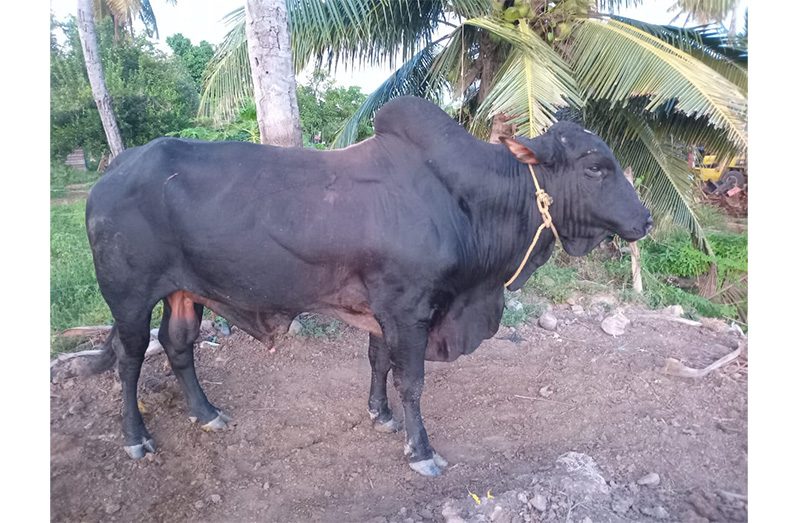- a testament to policy-driven agricultural success
AT 68 years old, Colin Griffith of Golden Fleece, West Coast Berbice, stands as a remarkable example of resilience, innovation, and agricultural transformation.
The father of thirteen and one of Region Five’s most respected farmers, Griffith was recently crowned the winner of the Guyana Livestock Development Authority’s (GLDA) inaugural Ruminant Competition, held at the Rising Sun Turf Club, West Coast Berbice.
His story embodies the essence of Guyana’s agricultural renaissance—where government policy, technical support, and farmer determination converge to advance national food security and rural prosperity.
Griffith operates an integrated livestock and crop farm, managing sheep, ducks, broiler chickens, and Creole layer birds for egg production. Alongside his livestock, he cultivates a productive vegetable garden nourished by organic manure from his animals, promoting a circular system of sustainable farming. He takes pride in producing wholesome, chemical-free foods, emphasising both nutritional value and environmental stewardship.

However, it is his success in cattle rearing that has earned him national recognition. His winning entry—a three-year and nine-month-old crossbred bull affectionately named “Black Boy”—represents the tangible outcomes of the GLDA’s Artificial Insemination (AI) Programme. “Black Boy” is the offspring of a Zebu cow and Beefmaster semen sourced from GLDA’s breeding programme, an initiative designed to enhance the genetic quality of Guyana’s national herd.
According to Griffith, this genetic pairing was intentional and strategic. “The Zebu-Beefmaster cross is one of the best combinations for beef production,” he explained. “The Zebu brings heat tolerance, hardiness, and disease resistance—traits vital for tropical conditions—while the Beefmaster contributes excellent muscle conformation, growth rate, and meat quality.” This hybrid breed is particularly well-suited to the challenges of climate change, thriving under high temperatures and variable pasture conditions while maintaining superior carcass quality.
Griffith’s journey into farming was born out of adversity. After being retrenched from the bauxite company BERMINE at Everton, Berbice, he turned to cattle rearing to sustain his family. His early beginnings were humble—he started with just two cows purchased from his grandmother, after an initial calf died. From this small start, he built a thriving operation through persistence, innovation, and the judicious use of government support.
For many years, Griffith relied on natural breeding, but his introduction to the GLDA’s AI Programme transformed his farm. “There are many benefits to using AI,” he said. “It allows you to access high-quality genetics without the expense of maintaining a bull and gives you options to select for either beef or dairy production. The GLDA team provides guidance every step of the way—from choosing breeds to monitoring heat cycles and ensuring proper nutrition.”
Though his herd is smaller compared to some regional counterparts, Griffith takes pride in its health, vitality, and productivity. “My animals are grass-fed and treated like my children,” he said warmly. “I even play with them—‘Black Boy’ who loves when I scratch his head.”
In addition to cattle rearing, Griffith is also the most popular milk man in his community. He not only supplies milk from his own animals but also buys milk from other farmers to meet the growing demand of his customers. Confident in the quality of milk he sells, Griffith credits the GLDA’s Clean Milk Initiative for raising standards in the dairy sector. “Farmers in our region have benefitted greatly from the training on hygienic milk production,” he noted. “Because of that, I can assure my customers that the milk they buy is safe, fresh, and of the highest quality.”
Griffith’s success, he emphasises, is closely tied to the consistent support he receives from GLDA officers including Livestock Officer Osbert Rodney and AI Technician Mahesh Jagmohan. “They are just a phone call away,” he said. “They have helped me understand everything from proper heat detection to feeding strategies that improve conception rates.”
Looking ahead, Griffith remains optimistic about the livestock industry’s future, especially under the People’s Progressive Party/Civic (PPP/C)-led government headed by President Dr. Irfaan Ali. He commended the administration’s investments in Region Five, particularly in infrastructure, artificial insemination services, and training programmes that empower farmers to increase productivity and sustainability. “The government’s support and policies have made a big difference,” he said. “Without that, small farmers like me would not have had the opportunity to reach this level.”
From a retrenched labourer with two cows to a national ruminant champion, Colin Griffith’s journey is a story of transformation fuelled by policy-driven opportunity, technical guidance, and personal determination. His achievements stand as a living example of how government interventions—through agencies like the GLDA—are strengthening Guyana’s livestock sector, one farmer at a time.
Griffith’s message to other farmers is simple yet profound: “Start small, work hard, and take advantage of the programmes available. Success is possible when you combine effort with the knowledge and support that the government provides.”



.jpg)








